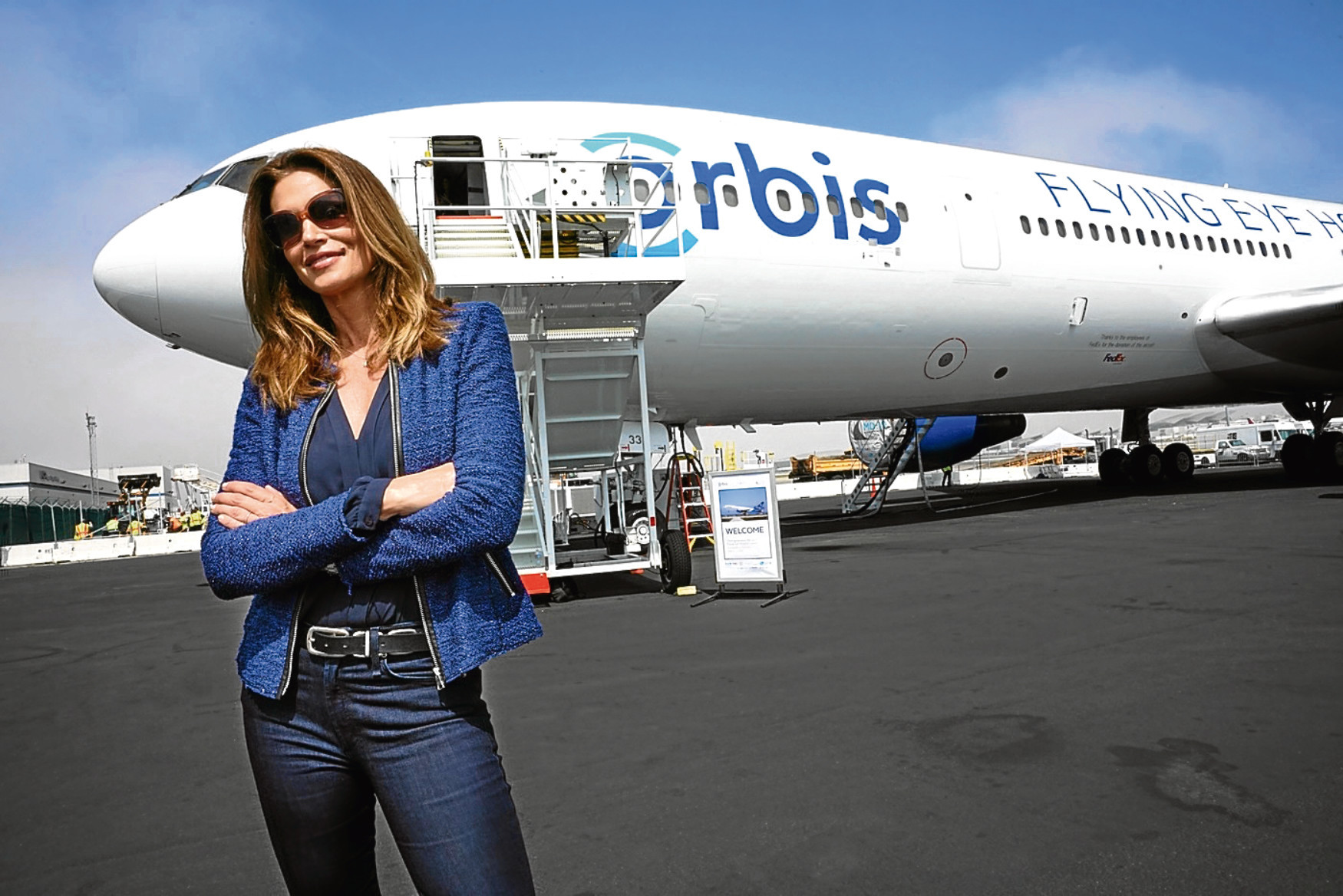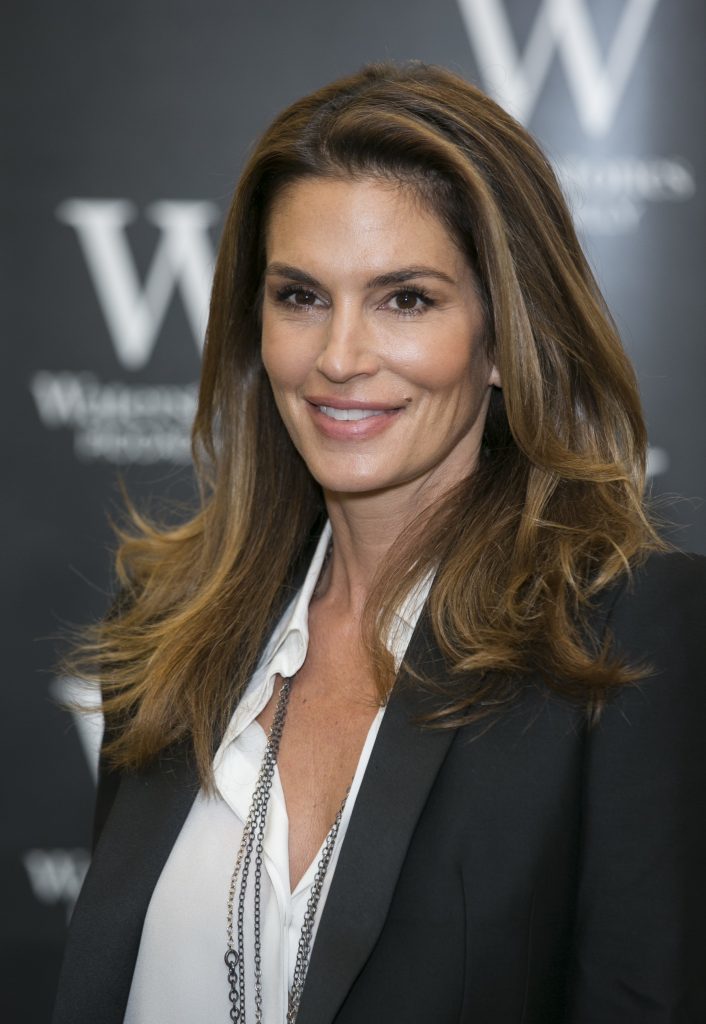
MODEL Cindy Crawford has always been a philanthropist.
Since the start of her career, during which she was one of the five original “supermodels”, she’s donated the proceeds from her calendars to medical research.
This was inspired by losing her brother, Jeff, to leukaemia when he was aged 10 and she was just three.
And recently Cindy, who retired in 2000 but could still grace any magazine cover, has added her support to another good cause by helping roll out international eye charity Orbis’s new Flying Eye Hospital.
Omega watches are partners with Orbis — among other things, they sponsor the important cargo of teddy bears the hospital carries, which are given to every paediatric patient to offer some comfort.
So mum of two Cindy, an Omega brand ambassador for more than 20 years, went on a Flying Eye Hospital trip to Peru to see the one of their sight-saving programmes in action.
She was invited to watch an eye surgery, but admits she wasn’t sure she could handle it.
“It was pretty intense,” says Cindy. “I had to step out at one point.
“But I did get to meet the children who were going in for operations beforehand — we were hanging out in the waiting-room with them while they were being prepared for surgery.”
Daughter Kaia, then 13, accompanied her on the trip.
“I want her to see that I do work for my money,” Cindy explains.
“It’s glamorous in a way, but you don’t really understand the work that’s involved, especially with a long-term relationship like this. It’s not all glitz and fabulousness.”
The two spent their time in Trujillo, a little village in the north-east of Peru, and Cindy says: “It was such a unique opportunity to be able to see what Orbis does first-hand, and also interact with local people in a real way.
“I think charity is more meaningful if you have a connection.
“For me to give money to the hospital where my brother was treated, it’s easy.
“I saw the work they did, I experienced it first-hand. Find something that resonates with you — I’ve found that with Orbis.”
Since 1982, Orbis, who fight blindness across the globe, have performed more than two million screenings, examinations and surgeries in 92 countries, as well as training more than 30,000 medical professionals.
They have just rolled out their third-generation Flying Eye Hospital, converted from an MD-80 freighter.
More than six years in the making, it’s the world’s only mobile ophthalmic teaching hospital on board an aircraft.
It features live broadcast capabilities enabling Orbis, alongside its team of more than 400 medical volunteers, to train more doctors, nurses and healthcare professionals — ultimately treating more people and restoring their sight.
Across the globe, there are 39 million people who are blind, with four out of five suffering from preventable conditions.
Of those blind people, 90% live in developing countries where they cannot access sight-saving treatments that many of us take for granted.
Orbis transforms lives by focusing on all areas of preventable blindness, from cataracts — the world’s leading cause of avoidable sight loss — to refractive error, glaucoma and strabismus (severe squint), as well as diabetes-related conditions, with a particular emphasis on tackling childhood blindness.
One of their young patients, 10-year-old David, lives with his mum, dad and three brothers in the Copperbelt province of Zambia.
When he was four months old, his mother Maria noticed that his eyes didn’t seem normal.
She shared her concern with her family, but was encouraged to wait and see if the condition would go away on its own.
When David turned two, they took him to a traditional healer. The healer made incisions in his eyes and placed a variety of herbs in the wounds. His condition worsened.
As he got older, David was unable to play with friends and playing his favourite sport, football, had become impossible.
His teacher informed Maria that he was struggling at school and his writing had changed into illegible scribbles.
His older brother, Divine, explained that when he called to David to join him, David would walk straight past him before realising that he had missed his brother entirely.
Maria eventually went against family pressure to take him to the local clinic.
There, cataracts were diagnosed and he was referred to the Kitwe Eye Annex, 45km away.
David underwent successful cataract surgery under the skilled hands of an Orbis-trained ophthalmologist — the only paediatric specialist in the country
Although he had to repeat Class 3, he is back in school and spends every other waking moment playing football.
Now his sight is restored, David dreams of one day playing for his favourite team Chelsea.
To learn more about Orbis, visit www.orbis.org
READ MORE

Enjoy the convenience of having The Sunday Post delivered as a digital ePaper straight to your smartphone, tablet or computer.
Subscribe for only £5.49 a month and enjoy all the benefits of the printed paper as a digital replica.
Subscribe